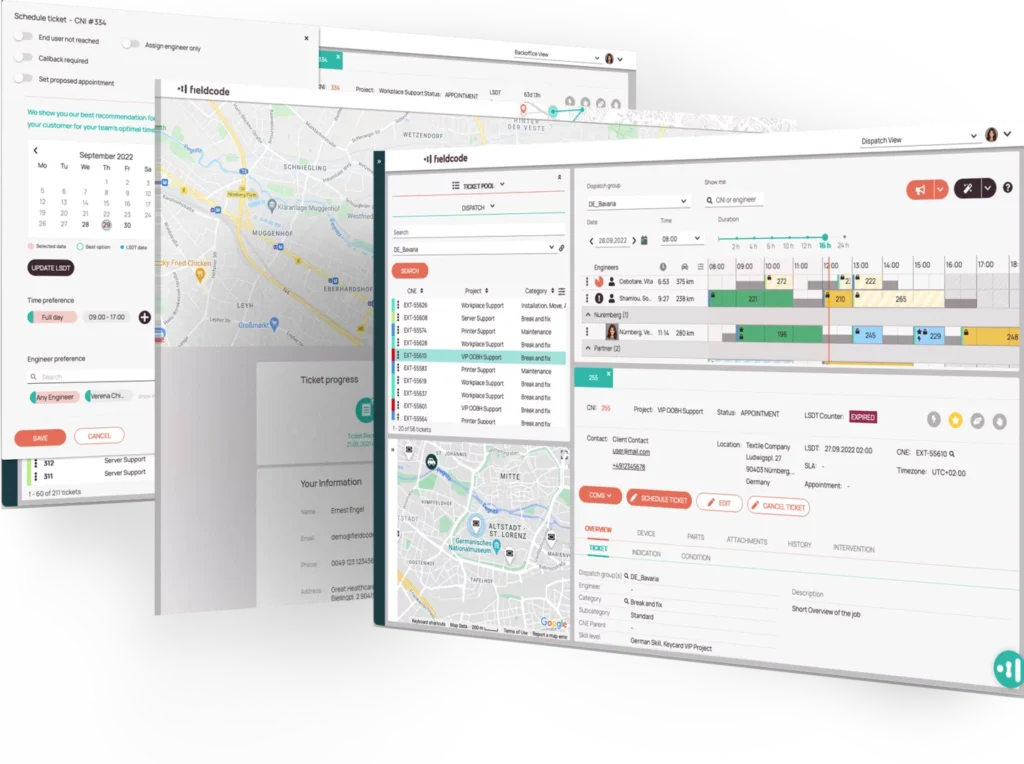What is field service management?
Field service management is the process of organizing and overseeing work carried out at customer locations. It includes planning jobs, assigning technicians, tracking performance, and keeping customers informed.
To manage this complexity, organizations rely on field service management (FSM) software — digital platforms that coordinate scheduling, dispatching, routing, and communication in one place. These tools replace spreadsheets, phone calls, and manual updates with structured workflows that improve consistency and scalability.
Some platforms, like Fieldcode, introduce Zero-Touch automation — a new approach designed to eliminate most of the administrative work required to get an engineer or technician on site, ensuring tickets move from creation to completion without delays
Why businesses need FSM software
Field operations without specialized tools quickly become inefficient and error-prone:
- Missed appointments and SLA breaches are more likely with manual scheduling.
- Dispatchers face constant overload managing phone calls and spreadsheets.
- Technicians sometimes arrive without the right information or materials.
- Inefficient routing increases travel costs and wasted time.
- Managers lack real-time visibility into performance and quality.
FSM software was developed to address these challenges by providing a structured, digital way to plan, execute, and track work in the field. With automation layered on top, it enables service organizations to deliver more reliable, cost-effective, and scalable operations.
What is field service management software?
FSM software provides a digital platform to coordinate jobs, dispatch technicians, optimize routes, and keep customers updated. It replaces spreadsheets, manual calls, and fragmented tools with a single workflow system used in industries such as IT, telecom, HVAC, and medical devices. Fieldcode extends these capabilities with Zero-Touch automation, streamlining workflows from start to finish to reduce manual work and improve consistency.
What features does field service management software include?
Modern field service management (FSM) software brings together several core capabilities that help organizations plan, deliver, and monitor service work. Below are the most common features across the industry — along with innovations introduced by Fieldcode that move FSM practices forward.
Scheduling and dispatch
Scheduling is the foundation of FSM. Most platforms assign jobs by matching technician skills, availability, and proximity to the customer site. This reduces dispatcher workload and ensures work is distributed fairly.
What many platforms overlook are the logistics behind each job. Spare parts need to be collected, equipment must be returned, and workloads often become uneven.
Fieldcode was the first to integrate these into the schedule itself. Its system accounts for Pick-Up and Drop-Off (PUDO) appointments directly in technician calendars and uses the Technician Efficiency Factor — an industry-first measure to balance workloads across teams. This makes scheduling not only efficient but also realistic and sustainable.
See scheduling in action with workload balancing
Read about the hidden cost of manual dispatching
Route optimization
Route optimization ensures technicians travel efficiently between jobs. Most FSM tools create routes that minimize travel distance and fuel use, cutting costs while increasing daily capacity.
The limitation is that routes rarely stay static. Emergencies, cancellations, and SLA-driven changes often require dispatchers to reshuffle plans manually.
Fieldcode’s Optimizer was designed to handle this challenge in real time. Routes automatically recalculate when priorities shift, keeping technicians on schedule and reducing dispatcher intervention.
Watch how real-time route optimization recalculates routes
Learn 5 ways to optimize technician routing for faster service
Technician mobile app
A technician mobile app gives field staff access to job details, customer information, and workflow steps on their device. This reduces paperwork and ensures data is captured digitally in the field.
The difference lies in how much guidance these apps provide. Many function as basic data-entry tools, leaving technicians to interpret workflows on their own.
Fieldcode’s mobile app acts as a digital guide. It provides step-by-step instructions, ensures compliance with standardized workflows, and works offline so no job stalls due to connectivity issues.
See how the mobile app guides technicians step by step
Read how to steer your workforce with guided mobile workflows
Explore the Fieldcode mobile app with step-by-step guided workflows
Customer portal
Customer portals give clients visibility and control over service requests. Standard portals allow appointment booking, basic tracking, and access to documentation.
The gap is that many portals stop at static updates. Customers still call the back office for real-time information.
Fieldcode extends the portal with live technician tracking and ETA-based notifications. It also adapts to industry-specific SLAs, giving enterprises flexibility while improving transparency for customers.
Watch how the Customer Portal improves transparency
Read how customer portals improve self-service in field service
AI voice agents
AI is beginning to shape FSM, often in the form of chatbots or bolt-on integrations. These can answer simple questions but rarely tie into the full workflow.
Fieldcode was one of the first platforms to embed voice AI agents directly into FSM processes. They handle inbound and outbound calls in natural language, confirming appointments, opening cases, and providing updates — even after hours. This ensures customer communication continues without adding pressure to staff.
Watch how Fieldcode AI voice agents automate customer communication
Read about what AI voice agents really do in field service
Reporting and analytics
Reporting dashboards help managers track service performance, costs, and SLA compliance. Most platforms provide historical data for review and decision-making.
The limitation is that traditional reporting shows problems only after they occur.
Fieldcode introduced real-time SLA tracking and forecasting. Automated alerts notify managers before service quality slips, while forecasting tools help plan capacity and resources with greater accuracy.
Explore forecasting features that help service teams plan ahead and reduce risk
Learn the key KPIs to measure productivity in field service teams
Explore all field service management features
Our features help technicians outperform with automated scheduling & dispatch, route optimization, FSM mobile app, automated planning & BI Forecasting.
SEE ALL FEATURESWhat are the benefits of field service management software?
Organizations adopt FSM software to make service delivery more reliable and cost-effective. The most common benefits include:
- Improved visibility and control → Managers gain insight into SLA compliance, technician performance, and service bottlenecks. This visibility supports better planning and proactive adjustments.
Learn how data-driven insights and analytics help your field operations - Reduced manual effort → Automating repetitive steps like scheduling and routing reduces dispatcher workload and ensures technicians receive accurate job information.
Read how to fix dispatch–technician misalignment in field service - Faster response times → Automatic scheduling and routing minimize delays between ticket creation and technician dispatch, helping service teams respond to urgent requests.
Learn how real-time scheduling helps teams respond to urgent requests - Better customer experience → Customers benefit from accurate ETAs, real-time updates, and clear communication, reducing no-shows and building trust.
Watch how the Customer Portal improves transparency for customers
Read why self-service portals matter in field service
Who uses field service management software?
What is Zero-Touch automation in field service management?
Traditional FSM platforms reduce manual tasks, but dispatchers still spend significant time rescheduling jobs, updating customers, and managing exceptions. Zero-Touch automation is the next stage in FSM — designed to eliminate most of the administrative work needed to get an engineer on site.
With Zero-Touch FSM:
- Jobs are scheduled automatically based on skills, location, availability, and SLA priorities.
- Routes update in real time when emergencies or cancellations occur.
- Technicians follow guided workflows in the mobile app, ensuring compliance and consistency.
- Customers receive automatic ETAs and confirmations without back-office calls.
- Dispatchers keep oversight but only intervene for exceptions.
Fieldcode pioneered the Zero-Touch approach, making it practical for industries like IT, telecom, HVAC, and medical devices. This evolution allows service teams to focus on resolving customer issues while routine coordination runs quietly in the background.
See how Zero-Touch automation works in practice
Read the blog on the do’s and don’ts of field service automation
Field service management FAQs
1. What is field service management software?
FSM software is a digital platform that manages the full service workflow — scheduling, dispatch, technician work, and customer updates — in one system. It replaces spreadsheets, phone calls, and fragmented tools.
2. What are the core features of FSM software?
Key features include scheduling and dispatch, route optimization, technician mobile apps, customer portals, reporting, and integrations. Fieldcode extends these with Zero-Touch automation and AI voice agents.
3. How does FSM software improve efficiency?
It automates repetitive steps like scheduling, routing, and status updates — reducing manual work, speeding up response times, and improving service consistency.
4. What roles benefit most from FSM software?
- Dispatchers → less rescheduling work.
- Technicians → mobile app with guided workflows.
- Managers → SLA tracking and analytics.
- Customers → live updates and transparency
5. How is FSM software different from ERP or CRM systems?
ERP handles finance/logistics, CRM handles sales/relationships, while FSM is built for field operations — connecting people, jobs, and tools in the field.
6. How long does it take to implement Fieldcode FSM software?
Most organizations can start dispatching within a day using Fieldcode’s guided setup.
7. Does Fieldcode integrate with other systems?
Yes — it integrates with ERP, CRM, and inventory systems to keep operations connected.
8. What should I look for when choosing FSM software?
Consider:
- Ease of deployment and onboarding
- Mobile usability for field teams
- Workflow automation coverage
- Reporting and SLA tracking
- Integration with your existing systems
- Transparent pricing
9. How much does FSM software cost?
Pricing for FSM software usually depends on the number of users, the features included, and the type of license. Some providers increase costs as usage grows, while others offer stable, long-term pricing. Fieldcode uses a perpetual license model so organizations can plan with predictable costs.
10. Is FSM software suitable for small teams as well as enterprises?
FSM software scales to different needs. Smaller teams often use it to digitize scheduling and reduce paperwork, while large enterprises rely on advanced features like SLA tracking, automation, and multi-region coordination. Fieldcode supports both scenarios with the same core platform.
11. Does Fieldcode offer a free version?
Fieldcode offers a 90-day free trial of the full platform, giving teams time to test workflows in real service operations.
12. Why choose Fieldcode FSM software?
Fieldcode combines the core functions of FSM software with Zero-Touch automation, so tickets move from creation to completion without manual dispatcher input. It also offers perpetual license pricing for predictable long-term costs and guided onboarding that lets organizations start dispatching jobs within a single day.

Ready to explore FSM software in action?
See how Fieldcode applies Zero-Touch automation to scheduling, routing, and customer updates — so your teams spend less time on admin and more time on service.
GET A DEMO







